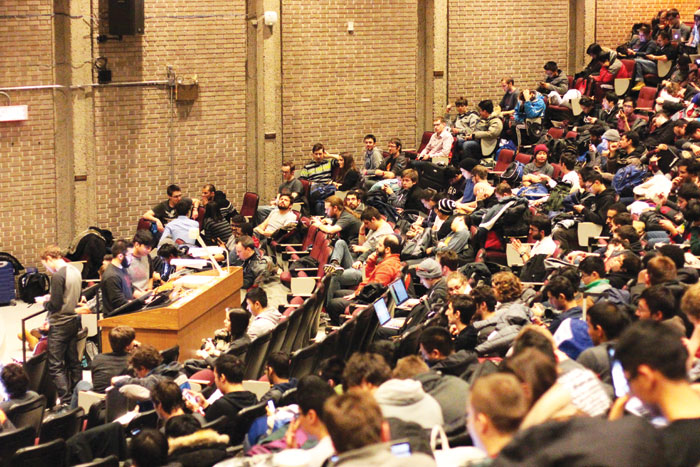In a test of will power, determination, and innovation, McHacks presented an incredible challenge to its participants—twenty-four hours’ worth of non-stop creative coding fueled by energy-drinks. Traditionally, ‘hackathons’ are 24 to 36 hours long and invite coders to develop an application, website, or program. Those with the best, most creative, and useful program are judged by a panel and the top 10 teams are awarded prizes. However, the success of hackathons largely relies on sponsorship provided by industrial companies.
“Hackathons are only made possible by industry sponsors,” explained Deepanjan Roy, a U3 computer science and math major, and one of the 18 co-organizers for McHacks this year. “These sponsors come into the hackathon and stay up for the whole event and interact with the hackers, and there’s a lot of opportunity to talk to people in industry.”
These interactions help students better understand the technology they’re using and to better understand how the industries are operating. The representatives who come to the hackathons from these companies are generally engineers and possess a strong understanding of what the students are trying to accomplish. This year, some of McHacks’ major sponsors are Nuance, Vungle, Namecheap and Shopify.
Hack McGill, which is responsible for organizing McHacks each year, was created by computer science students at the beginning of last year.
“There wasn’t really anything encouraging people to explore their own ideas, work on their own projects, meet people who wanted to do the same thing, and share common goals,” explained Xavier Denis, a U3 computer science student and one of the original founders of Hack McGill. “[After creating Hack McGill], we had over a hundred people, and since then, we’ve been trending upwards. We have around 1,000 members [today.]”
McHacks is not a McGill exclusive event, and welcomes students from other universities as well.
“McHacks currently has 622 people attending this weekend,” Denis explained. “We have between 100 to 200 McGill students [as well as] people from Waterloo, from Philadelphia, from Maryland.”
Part of the appeal of attending McHacks is that students often emerge after a grueling night of programming with job offers from the industry. According to Denis, around 10 per cent of the participants find jobs.
Furthermore, there is a wide range of projects that participants approach. Teams build funny, useful, and technical applications.
This year’s winners—hailing from Ontario—were Adrian Pawliszko, Karan Thukral, Julian Nadeau, and Vinny Crupi. The team developed an app called ‘Tendr’—a play on the word ‘Tinder’—that matches the user with restaurants in the area. The software is a native iOS app developed in Objective-C, a programming language. Other notable creations included ‘Banana for Scale,’ which converts any unit to ‘banana-size,’ a speed-reading app called ‘Parrot,’ and ‘Shades of Grey,’ an app that lets you know how many shades of grey are in a photo. ‘Mad Curves’ was given the HackBoard’s Choice award, designated for the organizers’ choice of best app. It was developed by Miles Cranmer, U0 Science, that uses Oculus Rift DK2—a virtual reality headset—to navigate a 3D graph of any equation.
While McHacks may have ended, these students will continue to code and program for years to come. And the experiences they gain from events like these are invaluable.
“[In computer science], the stuff you learn in school is not often very practical and applicable, so we have hackathons that teach you to build something instead of just learning the theory behind it,” Roy said.









